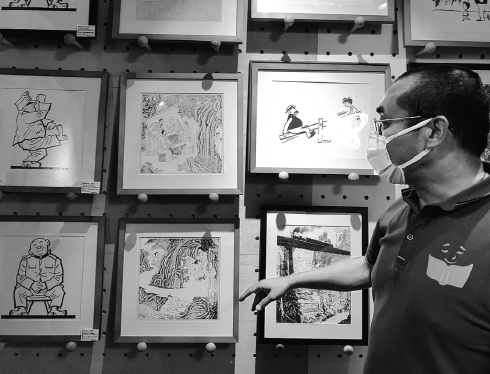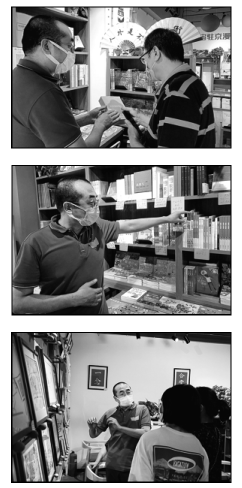Man with a funny plan
An employee at a publishing house manages a new bookstore in Beijing, where humor is the theme, Yang Yang reports.

With society in China developing fast, people are facing a lot of pressure, so they are looking for ways to relax and reduce stress. That is why 50-year-old Qi Hang wanted to open a bookstore on the theme of humor.
A nine-minute walk from Beijing's Chaoyangmen subway station, a branch of the Xinhua Bookstore Group, the Humor Bookstore, with an avocado-green facade, is among the first bookstores on such a theme in the country.
Entering the bookstore, one can see a table, on which are stacks of children's books. Above hang curtains that carry words that translate to "being happy is everyone's rigid demand".
On the shelves in the 111-square-meter store, one can find books by writers from home and abroad: essays by Wang Zengqi and Li Juan, works by crosstalk master Hou Baolin, a collection of Chinese crosstalk works, The Good Soldier Svejk: and His Fortunes in the World War by Czech humorist and satirist Jaroslav Hasek, Bream Gives Me Hiccups by US actor Jesse Eisenberg, Six Plays of Shakespeare, The Story of a Shipwrecked Sailor by Gabriel Garcia Marquez, Bridget Jones's Diaries: A Novel by Helen Fielding, the satire-humor volume of The Complete Collection of Edgar Allan Poe's Short Stories and so on.
Apart from humorous or satire works, there are also biographies and autobiographies of the humorists and satirists, such as Quite a Good Time To Be Born: A Memoir: 1935-1975 by British writer David Lodge and a collection of Chinese fairytale writer Zhang Tianyi's diaries, as well as books that explore the logic of humor like The Humor Code: A Global Search for What Makes Things Funny.
Stickers with handwritten information are used to introduce the writers. For example,"If you feel life is boring, read Wang Zengqi" or "Li Juan is a tailor, but also the most humorous essayist in China, definitely the most. The shop owner strongly recommends her".
In total, there are more than 1,000 books of over 700 titles displayed at the bookstore, and Qi says he has read 80 percent of them.
On a Tuesday afternoon in early August, an old couple were leafing through books at the bookstore. They bought two collections of jokes published by Duzhe (Readers) magazine from 1981 to 2013. At the suggestion of Qi, they also bought a collection of the works by crosstalk master Hou.
"It's a classic and out of print, and it's only 36 yuan ($5.6)," Qi says.
More than a decade ago, reading Taiwan writer Jong Fang-ling's books about bookstores around the world, Qi had a dream to open a bookstore one day.
Around seven years ago, when he was working at China Bookstore, a publisher of classic books, he started thinking about Chinese people's sense of humor. He found in the internet age, people from different cultures communicate more with each other, and humor is a great lubricant in communication. However, Chinese people often appear comparatively serious, "so I was wondering whether I could train people to be humor-sensitive," he says.
Although he did not carry out this plan, as an editor, he decided to compile a series of books as the Humor Library collection, and made four books based on works by Lu Xun, Lao She and ancient Chinese classics like A New Account of the Tales of the World.
He then drew a blueprint for his project-bookstores, goods, comics, comedies and even a humor-themed park.
It was not until last year when he finally got the chance to realize his dream. He first wanted to open a bookstore for the elderly like his parents to help them to live a better life. However, he says, he found that elderly people in general spent less time on books because of poor eyesight. Moreover, he had limited knowledge of books for aged people.
But by then, he had already collected more than 700 book titles related to humor. Qi says he observed people needed laughter, especially confronted with pressure from work and life, so it was time to open a humor bookstore. Avocado green was chosen as the theme color of the store. Many famous bookstores around the world are green as is postal service in China. "Post offices help to deliver information and our bookstore delivers laughter."
Besides, avocado green is a fashionable color favored by many young people.
To better run the new bookstore, Qi plans to operate multiple businesses: books, cultural products, drinks, exhibitions, shows, training and publishing. Qi says if this one succeeds, he could copy the business model and open more branches in the country.
Since the bookstore opened in June, six investors have approached him to talk about franchises so far.
"They believe that humor bookstores can bring laughter to people and everybody needs laughter, so it's workable," Qi says.
He divided the store into four parts, a space for children to read, a space for humorous works by Chinese writers, foreign writers, writers' biographies and essays, instructive books about how to be humorous, a promotion space for books on a monthly basis, and an art space. Now, at the art space, an exhibition of comics inspired by stamps by Wang Jiucheng, professor of the National Academy of Chinese Theater Arts, is on. Another exhibition is on the works of Chen Xiaoying, the founder of comedic aesthetics discipline on the mainland.
The art space can also be transformed into a small theater to host shows or show films to 20 to 30 people. Qi says humor is a way for people to reconcile with society, time and the world, and by reading humorous or satirical writings or relating the stories to others, people can learn the skills to become more humorous.




Today's Top News
- Trump says 'a lot closer' to Ukraine peace deal following talks with Zelensky
- China pilots L3 vehicles on roads
- PLA conducts 'Justice Mission 2025' drills around Taiwan
- Partnership becomes pressure for Europe
- China bids to cement Cambodian-Thai truce
- Fiscal policy for 2026 to be more proactive






























